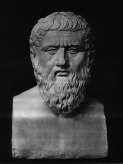

Part 1. The first part of your exam consists of 11 either true/false or multiple
choice questions and five short answer questions. Each question is worth five
points each. The following questions are very similar or maybe even identical
to the ones on the exams. After you answer each one, then go back through the
notes you took over the readings and videos to be sure you answered them correctly.
1. T / F: Reductionsim is the view that processes like thought and life are
nothing more than physical and chemical processes
2. Plato believed the self consisted of
a. reason, appetite, and desire
b. reason, spirit, and appetite
c. mind, body, and soul
d. reason, spirit, and soul
e. id, ego, and psyche
3. Western religious views, unlike Existentialist views, adhere to
a. an essentialist view of human nature.
b. a non-deterministic view of human nature.
c. an existentialist view of human nature.
d. a deterministic view of human nature.
4. T / F Descartes held that thinking is part of the material self.
5. In the dialogue, Euthyphro, Socrates is trying to get Euthyphro to define
a. beauty
b. holiness
c. justice
d. philosophy
e. none of the above
6. T / F: According to Jean Paul Sartre, self-deception or bad faith is the
attempt to avoid anguish by pretending we are completely free
7. T / F The defining characteristic that makes something what it is is its
essence.
8. According to Buddhism, philosophical wisdom will free us from
a. mundane tasks and activities
b. the time and effort of study
c. the cycle of birth, suffering, death and rebirth
d. decidding for ourselves
e. all of the above
9. In his search for a belief beyond doubt, Descartes claimed that
a. To be is to be perceived
b. Evil begets evil
c. I think therefore I am
d. The unexamined life is not worth living
10. T/F According to the video, What is Philosophy, the Socratic method
primarily focuses on answers.
11. The study of philosophy
a. requires long, painstaking effort
b. risks challenge to important personal beliefs and assumptions
c. will eventually resolve all questions
d. all of the above
e. a and b only
12. T/F Epistemology deals with the study of essences.
3. Using all the videos and readings thus far, explain Plato's philosophy. Be sure to include all aspects.
4. Using all the videos and readings thus far, explain Rene Descartes' philosophy. Be sure to include all aspects.
5. Video three raises the issue of the mind/body problem and numerous philosophers
weigh in on the debate. Using information from both the videos and the
book, explain the debate between Cartesian Dualism and the different forms of
Materialism.
6 . First, explain the different views of the self and then identify strengths
and weaknesses of each.
7 . Using both the videos and the readings, explain the different viewpoints
concerning the question: "What is Human Nature?".
8 . Explain how Hegel, Kant, and Descartes would answer the question, are we
independent and self-sufficient individuals?
9 . Define and/or identify each of the following: epistemology, metaphysics,
intrinsic value, existentialism, Platonic Forms, psychologism egoism, autonomy,
a priori, teleology, functionalism, materialism, no-self view, myth of the cave,
dualism, the traditional divisions of philosophy
 Plato
Plato Course Home Page
Course Home Page